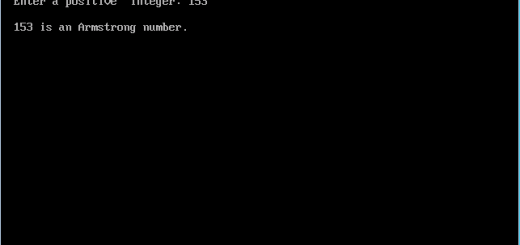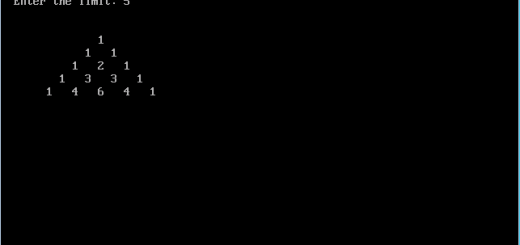Factorial of a Number in C using Recursion
Before going to the program first let us see what is Factorial of a Number? and what is Recursion?
Factorial of a Number:
The factorial of a Number n, denoted by n! , is the product of all positive integers less than or equal to n.
The value of 0! is 1 according to the convention for an empty product.
For example,
5! = 5 * 4 * 3 * 2 * 1 = 120
Recursion:
In C programming language, if a function calls itself over and over again then that function is known as Recursive Function.
The process of function calling itself repeatedly is known as Recursion.
Related: Factorial of a Number in C without using Recursion
Program code for Factorial of a Number using Recursion:
#include<stdio.h>
#include<conio.h>
void main()
{
int num,f;
clrscr();
printf("\n Enter the number: ");
scanf("%d",&num);
f=fact(num);
printf("\n The factorial of the number %d is %d",num,f);
getch();
}
int fact(int n)
{
if(n==0 || n==1)
return 1;
else
return(n * fact(n-1));
}
Related: Factorial of a Number in C++ using Recursion
Working:
- First the computer reads the number to find the factorial of the number from the user.
- Then using recursive function the factorial value is calculated and returns the factorial value to main function.
- Finally the factorial value of the given number is printed.
Step by Step working of the above Program Code:
Let us assume that the number entered by the user is 4.
- It assigns the value of n=4.
- Then using a variable f the recursive function fact(n) is called.
2.1. n==0 || n==1 (4==0 || 4==1) if condition is false.
So it goes to the else part.
else
return(n * fact(n-1)) So, (return(4 * fact(3))) // function calls itself
2.2. n==0 || n==1 (3==0 || 3==1) if condition is false.
So it goes to the else part.
else
return(n * fact(n-1)) So, (return(3 * fact(2))) // function calls itself
2.3. n==0 || n==1 (2==0 || 2==1) if condition is false.
So it goes to the else part.
else
return(n * fact(n-1)) So, (return(2 * fact(1))) // function calls itself
2.4. n==0 || n==1 (1==0 || 1==1) if condition is true.
So it return the value 1 to fact(1) in step 2.3.
which further return the value 2 to fact(2) in step 2.2.
which further return the value 6 to fact(3) in step 2.1.
which further return the value 24 to f in main function.
- Finally it prints as given below
The Factorial of the number 4 is 24
- Thus the program execution is completed.
Output:
TO DOWNLOAD THE PROGRAM CODE :CLICK HERE




